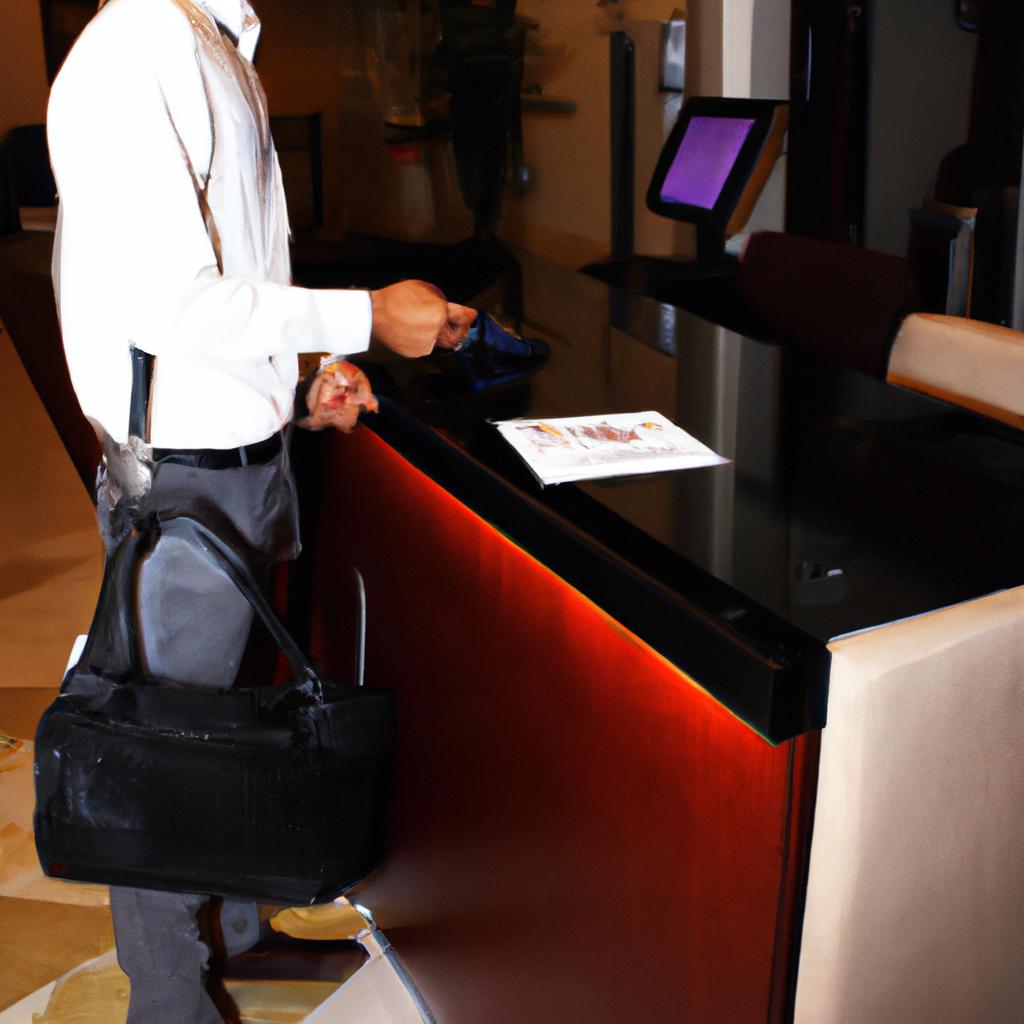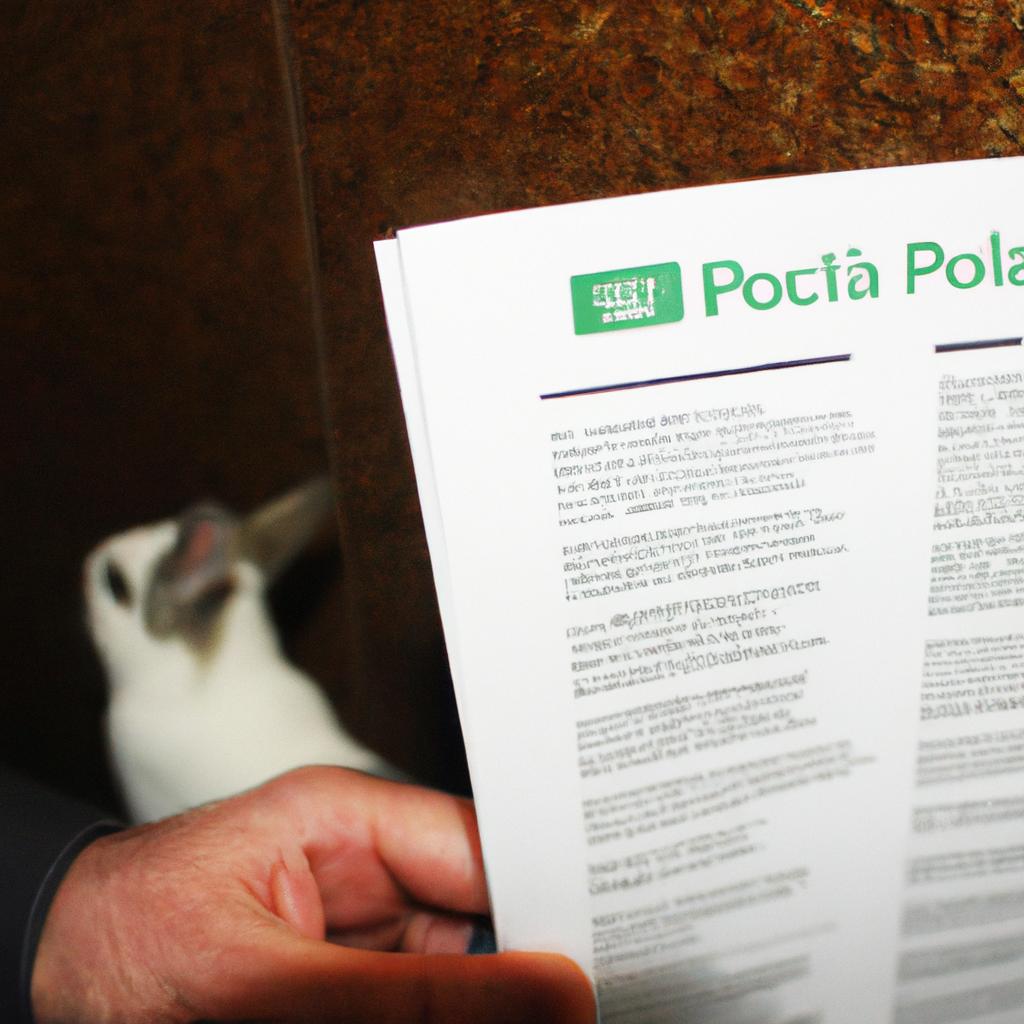One of the first interactions guests have with a hotel is during the check-in process. This crucial step sets the tone for their stay, and understanding the various rules and regulations surrounding hotel check-ins is essential for both guests and hotel staff. For instance, imagine a traveler arriving at a luxurious resort only to find out that they cannot check in until 3 pm due to strict policies. Such scenarios highlight the significance of exploring check-in policies in order to ensure a seamless experience for all parties involved.
In this article, we will delve into the world of check-in policies, examining the rules and regulations implemented by hotels across different regions and types of establishments. Through an academic lens, we aim to shed light on key aspects such as timing restrictions, identification requirements, payment procedures, and special accommodations. By thoroughly exploring these topics, readers will gain valuable insights into how hotels manage guest arrivals while maintaining efficiency and providing excellent customer service. Whether you are a seasoned traveler or someone new to staying in hotels, this exploration promises to enhance your understanding of the intricacies behind hotel check-in processes.
Types of Check-In Procedures
One common example of a hotel’s check-in procedure is the traditional method, where guests are required to physically go to the front desk upon arrival. In this scenario, guests present their identification and provide necessary details such as contact information and payment methods. The hotel staff then verifies the reservation, assigns a room, and provides the guest with relevant information regarding amenities and services available during their stay.
Another type of check-in procedure gaining popularity in recent years is online check-in. With advancements in technology, many hotels now offer the convenience of checking in remotely before arriving at the property. Guests can access an online portal or mobile application provided by the hotel to input their personal details, preferences, and any special requests. This allows for a smoother and expedited check-in process upon arrival, as guests may only need to collect their key cards from designated kiosks or receptionists.
In addition to these two main methods, some hotels have implemented self-service check-in options using automated machines located in the lobby area. These machines guide guests through step-by-step instructions to complete their check-in process independently. By providing touch-screen interfaces and clear prompts, these kiosks aim to reduce waiting times and enhance overall efficiency.
To evoke an emotional response from potential guests who value convenience and efficiency when choosing accommodation options, consider the following advantages:
- Online check-in eliminates long queues at the front desk.
- Self-service kiosks allow for a quick and hassle-free experience.
- Personalized customer preferences can be easily communicated through remote check-in platforms.
- Enhanced security measures ensure privacy protection during data transmission.
| Advantages of Different Check-In Procedures | Traditional Method | Online Check-In | Self-Service Kiosk |
|---|---|---|---|
| Convenience | Requires physical presence | Can be done remotely | Self-guided and efficient |
| Time-Saving | May involve waiting in line | Reduces time spent at check-in counter | Minimizes wait times |
| Personalization | Limited ability to customize preferences | Allows for customization of stay | Offers personalized options |
In conclusion, hotels employ various types of check-in procedures to cater to the diverse needs and preferences of their guests. The traditional method requires personal presence at the front desk, while online check-in provides a remote option that enhances convenience. Additionally, self-service kiosks offer an independent approach that saves time and minimizes waiting periods. These different methods aim to optimize efficiency and enhance the overall guest experience during the check-in process.
Moving forward into the next section on “Check-In Times and Procedures,” we will explore how hotels manage check-in timings based on industry standards and specific hotel policies.
Check-In Times and Procedures
Exploring Hotel Check-In Rules and Regulations: Check-In Times and Procedures
Now that we have discussed the different types of check-in procedures, let us delve into the specific rules and regulations surrounding hotel check-in times and procedures. To illustrate this further, imagine a scenario where you arrive at a luxurious beachfront resort after a long day of traveling. The time is 10:00 AM, but according to the hotel’s policy, check-in does not begin until 3:00 PM. You find yourself eager to settle into your room and unwind from your journey, only to be met with unexpected waiting.
Understanding these policies is crucial for both hotels and guests alike. Here are some key points to consider:
- Early Check-In: Some hotels may offer early check-in options for an additional fee or as part of their loyalty program benefits. This allows guests to access their rooms before the designated check-in time.
- Late Check-In: Conversely, late check-ins are also accommodated by many establishments. Whether it’s due to delayed flights or unforeseen circumstances, hotels often provide a seamless process for guests arriving during non-standard hours.
- Peak Season Considerations: During peak season or high-demand periods, hotels typically enforce stricter adherence to standard check-in times. This ensures sufficient time for housekeeping staff to prepare rooms adequately and maintain operational efficiency.
- Room Availability: It’s important to note that even if you arrive within the official check-in window, there might still be instances when your room is not ready immediately. Hotels prioritize cleanliness and maintenance; thus, they may require extra time between guest departures and arrivals.
To grasp these nuances more effectively, refer to the table below showcasing common hotel practices regarding check-in times:
| Time Range | Check-In Policy |
|---|---|
| Before 12 PM | Early check-in available (fees apply) |
| 12 PM – 3 PM | Standard check-in time |
| After 3 PM | Late check-in available |
Understanding these policies can help manage expectations and facilitate a smoother check-in experience for guests. By considering factors such as early or late arrivals, peak season considerations, and room availability, hotels aim to strike a balance between guest satisfaction and operational efficiency.
Moving forward, we will now explore the identification and verification requirements necessary during the hotel check-in process. Understanding these protocols ensures security measures are in place while providing an efficient registration experience for guests.
Identification and Verification Requirements
Section: Check-In Times and Procedures
In the previous section, we explored various aspects of hotel check-in policies. Now, let’s delve deeper into specific check-in times and procedures that hotels often enforce to ensure a smooth guest experience. To illustrate this further, consider the following example:
Imagine you have just arrived at a luxurious hotel after a long day of travel. Excitedly, you approach the front desk only to find out that it is well before the designated check-in time. The receptionist politely informs you that your room will not be ready for another two hours due to standard housekeeping procedures and high occupancy rates during peak season.
Understanding such instances can help guests better navigate their arrival plans and manage expectations. Here are some key points regarding check-in times and procedures in most hotels:
- Standard Check-In Time: Hotels typically set a fixed check-in time, usually around 3 p.m., to allow sufficient time for cleaning rooms after previous guests’ departures.
- Early Check-In Options: Some hotels offer early check-ins based on availability or for an additional fee. Guests may inquire about this option when making reservations or upon arrival.
- Late Arrivals: In cases where guests anticipate arriving late due to delayed flights or other circumstances, it is advisable to inform the hotel in advance as they might hold the reservation until a specified time.
- Exceptions and Special Requests: Hotels understand that certain situations require flexibility. They may accommodate requests for early arrivals or late departures based on individual circumstances.
To provide further clarity on these concepts, refer to the table below which outlines typical check-in times across different hotel categories:
| Hotel Category | Standard Check-In Time |
|---|---|
| Budget | 2:00 PM |
| Mid-Range | 3:00 PM |
| Luxury | 4:00 PM |
As evident from the table, higher-end hotels often have later check-in times compared to budget accommodations. This is attributed to their larger size and more extensive cleaning procedures.
Understanding hotel check-in times and procedures can help guests plan their trips effectively while minimizing any inconveniences that may arise from early arrivals or delayed room availability. In the subsequent section, we will explore the policies surrounding late check-ins and early check-outs in hotels, providing further insight into guest expectations and hotel operations.
Late Check-In and Early Check-Out Policies
Section H2: Identification and Verification Requirements
Now, let’s delve into another aspect of hotel check-in policies – late check-in and early check-out regulations.
Imagine this scenario: You have just landed at your destination after a long flight, exhausted and eager to settle into your hotel room. However, due to unforeseen circumstances or delayed flights, you find yourself arriving later than expected. Late check-in policies come into play in such situations, ensuring that guests are still able to access their rooms even if they arrive outside of regular check-in hours.
Late Check-In Policies:
- Prior notice: It is advisable to inform the hotel beforehand if you anticipate a late arrival. This allows them to make necessary arrangements and ensure someone is available to assist you upon arrival.
- 24-hour front desk service: Many hotels offer round-the-clock front desk services for guests checking in at any time of day or night. This ensures that there will always be staff members available to handle late arrivals.
- Keycard access: Some hotels provide keycards or codes for entry outside of normal operating hours. These allow guests with late arrivals to enter the premises and access their assigned rooms independently.
- Additional fees: Depending on individual hotel policies, there may be additional charges associated with late check-ins occurring beyond a certain hour.
- Frustration can arise when unexpected delays occur during travel, resulting in a late arrival at the hotel.
- The availability of 24-hour front desk service provides reassurance and convenience for weary travelers.
- Accommodations offering keycard access allow guests flexibility and independence during their stay.
- Being aware of potential extra fees for late arrivals helps manage expectations and avoid surprises.
Additionally, consider the following table highlighting common aspects related to late check-in policies:
| Aspects | Hotels with Late Check-In Policies |
|---|---|
| Notification | Prior notice is advisable |
| 24-hour service | Availability of round-the-clock front desk services |
| Keycard access | Provision of keycards or codes for entry outside operating hours |
| Additional fees | Potential charges may apply |
With these considerations in mind, guests can better navigate the process of late check-ins and be prepared for any additional requirements that may arise.
In our next section on “Check-In Restrictions and Special Requests,” we will explore how hotels handle specific requests from guests and address any potential limitations.
Check-In Restrictions and Special Requests
In a fast-paced world, hotel guests often find themselves needing to check-in or check-out outside of the standard hours. Hotel establishments have adapted to this demand by implementing late check-in and early check-out policies. These policies aim to accommodate guests’ needs while ensuring smooth operations within the hotel.
For instance, imagine a traveler arriving at a hotel after a long flight delayed due to inclement weather conditions. It is already past midnight, but the guest expects a seamless check-in process despite the late hour. In such cases, hotels may require prior notification of late arrivals to ensure that staff members are adequately prepared to assist guests upon their arrival.
To better understand how these policies work, consider the following bullet points illustrating common rules regarding late check-ins and early check-outs:
- Guests checking in after 10:00 PM must provide advance notice.
- A one-time fee may be charged for late check-ins occurring after a certain time (e.g., 12:00 AM).
- Early departures before regular breakfast hours may not include complimentary breakfast.
- Hotels can offer express checkout options for guests who need an expedited departure process.
The table below presents an overview of typical charges related to late check-ins and early check-outs:
| Late Check-In Fees | Amount |
|---|---|
| After 10:00 PM | $25 |
| After 12:00 AM | $50 |
| Early Check-Out Fees | Amount |
|---|---|
| Before 6:00 AM | No charge |
| Between 6:00 AM – 7:00 AM | $15 |
| Between 7:01 AM – 8:00 AM | $30 |
These policies exist for various reasons including staffing considerations, operational efficiency, and maintaining overall customer satisfaction. By adhering to these regulations, hotels can ensure a smooth check-in and check-out process for all guests.
Transitioning into the subsequent section on “Check-In Process for Guests with Disabilities,” it is important to note that hotels also have specific policies in place to accommodate individuals with disabilities. These policies are designed to provide equal access and assistance to disabled guests during their stay.
Check-In Process for Guests with Disabilities
Having examined the various check-in restrictions and special requests that hotels may have, it is important to also consider the specific check-in process designed to accommodate guests with disabilities. This section will delve into the guidelines and procedures implemented by hotels to ensure a comfortable stay for individuals with varying needs.
Section 3: Check-In Process for Guests with Disabilities
To better understand how hotels cater to guests with disabilities, let’s consider an example of a guest named Sarah who uses a wheelchair. Upon arrival at the hotel, Sarah approaches the front desk where she is warmly greeted by the receptionist. The staff member promptly assists her in completing the necessary paperwork while discreetly addressing any concerns or additional requirements Sarah may have.
Hotels strive to create an inclusive environment for all their guests, including those with disabilities. To achieve this goal, they often implement specific accommodations during the check-in process:
- Reserved accessible parking spaces near entranceways.
- Accessible ramps or elevators leading to main entrances.
- Wheelchair-friendly counters at the front desk.
- Sensory aids such as visual alerts or hearing loops available upon request.
Additionally, hotels frequently provide informational materials outlining accessibility options within their premises. These may include maps indicating accessible pathways, locations of accessible restrooms, emergency evacuation plans tailored for guests with different abilities, and contact information for further assistance.
By incorporating these measures into their check-in processes, hotels aim to foster an environment that promotes inclusivity and caters to diverse needs. Ensuring seamless access throughout the property not only enhances guest experience but also demonstrates a commitment towards equal treatment.
In summary, when it comes to accommodating guests with disabilities during check-in, hotels go above and beyond standard practices. Through reserved parking, accessible entrances, wheelchair-friendly counters, and sensory aids, they strive to create an environment that is welcoming and accommodating for all guests. By providing informative materials and tailored assistance, hotels not only meet legal obligations but also foster a sense of inclusivity and equality throughout the check-in process.
Please let me know if you need any further assistance or if there’s anything else I can help you with!
 Cedars Inn Auburn
Cedars Inn Auburn



